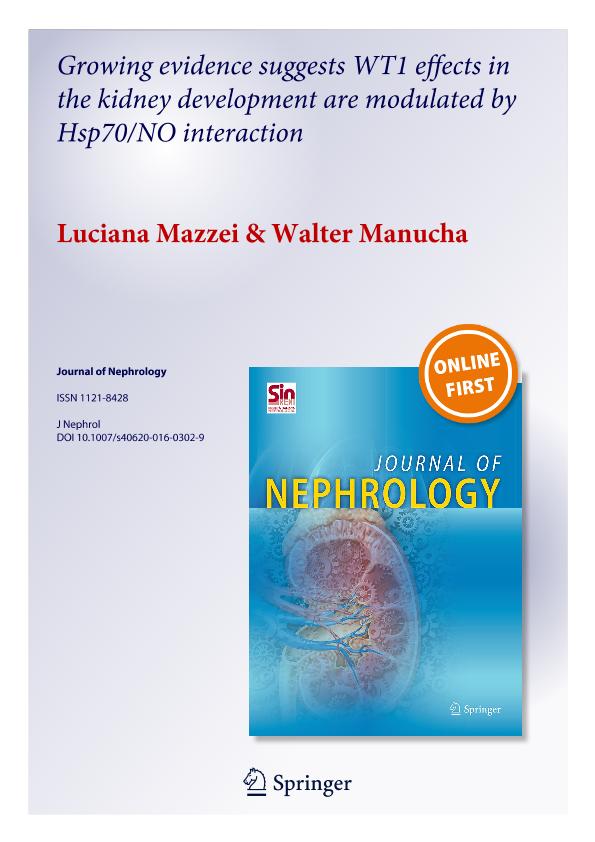Mostrar el registro sencillo del ítem
dc.contributor.author
Mazzei, Luciana Jorgelina

dc.contributor.author
Manucha, Walter Ariel Fernando

dc.date.available
2018-06-22T19:26:07Z
dc.date.issued
2017-02
dc.identifier.citation
Mazzei, Luciana Jorgelina; Manucha, Walter Ariel Fernando; Growing evidence suggests WT1 effects in the kidney development are modulated by Hsp70/NO interaction; Springer; Journal of Nephrology; 30; 1; 2-2017; 11-18
dc.identifier.issn
1121-8428
dc.identifier.uri
http://hdl.handle.net/11336/49725
dc.description.abstract
The study of kidney development at the cellular and molecular levels remains an active area of nephrology research. The functional integrity of the kidney depends on normal development as well as on physiological cell turnover. Apoptosis induction is essential for these mechanisms. A route to cell death revealed in the past decade shows that heat shock proteins (HSPs) and their cofactors are responsible for regulating the apoptotic pathway. Specifically, heat shock protein 70 (Hsp70), the most ubiquitous and highly conserved HSP, helps proteins adopt native conformation or regain function after misfolding. Hsp70 is an important cofactor for the function of Wilms’ tumour 1 (WT1) and suggests a potential role for this chaperone during kidney differentiation. In addition, we have demonstrated that WT1 expression is modulated by nitric oxide (NO) availability and Hsp70 interaction after neonatal unilateral ureteral obstruction. NO has been identified as playing an important role in the developing kidney. These findings suggest that Hsp70 and NO may play a critical and fundamental role in the capacity to modulate both apoptotic pathway and oxidative stress during kidney development. Furthermore, the design of experimental protocols that assess renal epithelial functionality in this context, could contribute to the understanding of renal development and alterations.
dc.format
application/pdf
dc.language.iso
eng
dc.publisher
Springer

dc.rights
info:eu-repo/semantics/openAccess
dc.rights.uri
https://creativecommons.org/licenses/by-nc-sa/2.5/ar/
dc.subject
Apoptosis
dc.subject
Heat Shock Protein 70
dc.subject
Kidney Development
dc.subject
Nitric Oxide
dc.subject
Wilms&Rsquo; Tumour 1
dc.subject.classification
Inmunología

dc.subject.classification
Medicina Básica

dc.subject.classification
CIENCIAS MÉDICAS Y DE LA SALUD

dc.title
Growing evidence suggests WT1 effects in the kidney development are modulated by Hsp70/NO interaction
dc.type
info:eu-repo/semantics/article
dc.type
info:ar-repo/semantics/artículo
dc.type
info:eu-repo/semantics/publishedVersion
dc.date.updated
2018-06-18T19:08:34Z
dc.identifier.eissn
1724-6059
dc.journal.volume
30
dc.journal.number
1
dc.journal.pagination
11-18
dc.journal.pais
Alemania

dc.journal.ciudad
Heidelberg
dc.description.fil
Fil: Mazzei, Luciana Jorgelina. Consejo Nacional de Investigaciones Científicas y Técnicas. Centro Científico Tecnológico Conicet - Mendoza. Instituto de Medicina y Biología Experimental de Cuyo; Argentina. Universidad Nacional de Cuyo. Facultad de Ciencias Médicas; Argentina
dc.description.fil
Fil: Manucha, Walter Ariel Fernando. Consejo Nacional de Investigaciones Científicas y Técnicas. Centro Científico Tecnológico Conicet - Mendoza. Instituto de Medicina y Biología Experimental de Cuyo; Argentina. Universidad Nacional de Cuyo. Facultad de Ciencias Médicas; Argentina
dc.journal.title
Journal of Nephrology
dc.relation.alternativeid
info:eu-repo/semantics/altIdentifier/doi/http://dx.doi.org/10.1007/s40620-016-0302-9
dc.relation.alternativeid
info:eu-repo/semantics/altIdentifier/url/https://link.springer.com/article/10.1007%2Fs40620-016-0302-9
Archivos asociados
